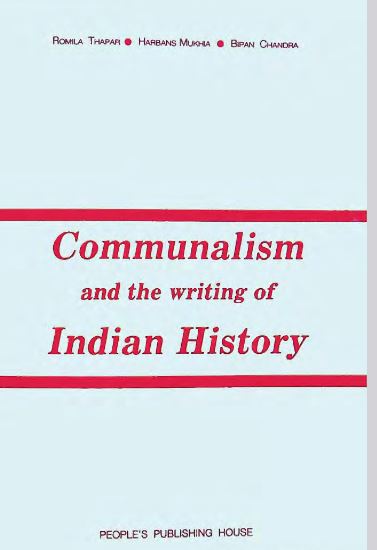Communalism And the Writing of Indian History is an insightful and thought-provoking essay book co-authored by renowned historian Romila Thapar and other distinguished scholars. Originally published in 1969, the book was reissued in 1999 with updated content reflecting the ongoing debates and discussions on communalism in India.
The essay book delves into the complex and contentious issue of communalism, tracing its roots in the historical context of India. It explores the various forms of communalism that have manifested through the centuries, from ancient history to modern times. The authors analyze the role of religion, politics, and social dynamics in fueling communal tensions and conflicts in Indian society.
One of the key themes addressed in the book is the intersection of communalism with the writing of Indian history. The authors critically examine how communal biases, prejudices, and agendas have influenced the interpretation and representation of Indian history. They argue that communalism has often distorted historical narratives, leading to the marginalization or erasure of certain communities, events, and perspectives.
Through a thorough analysis of historical sources, archives, and academic scholarship, the authors provide a comprehensive overview of the impact of communalism on the construction of Indian history. They highlight the importance of maintaining a critical and objective approach to historical research, free from communal biases and prejudices.
The essay book also discusses the role of historians and intellectuals in challenging communal narratives and promoting a more inclusive and accurate understanding of Indian history. The authors emphasize the need for a balanced and nuanced approach to the study of history, one that reflects the diversity and complexity of Indian society.
In addition to its scholarly analysis, Communalism And the Writing of Indian History also offers insights into the contemporary relevance of communalism in India. The authors discuss the challenges posed by communal politics, identity politics, and religious extremism, and the implications for the future of Indian society.
Overall, Communalism And the Writing of Indian History is a significant and timely contribution to the study of Indian history and communalism. It provides valuable insights into the complex interplay between religion, politics, and society in shaping historical narratives. The book serves as a critical reminder of the importance of maintaining intellectual rigor, objectivity, and inclusivity in the writing and interpretation of history.
In conclusion, Communalism And the Writing of Indian History is a must-read for anyone interested in understanding the historical and contemporary dynamics of communalism in India. It challenges readers to critically examine their own biases and assumptions, and to strive for a more nuanced and accurate understanding of Indian history and society.
Books Info
| Books name | Communalism And the Writing of Indian History |
| Editor | Romila Thapar et al. |
| No Of pages | 66 |
| Publisher | People Publishing House |
| Publication | 1969, 1999 8p. |
| Printed At | NA |
| Distributor | NA |
Communalism And the Writing of Indian History Sampel
Communalism And the Writing of Indian History Full Pdf Download

